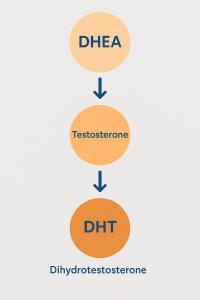MOPE Clinic Explains the Relationship Between DHT and DHEA in Hormone Health
How the Relationship Between DHT and DHEA Shapes Men’s Health
Understanding the relationship between DHT and DHEA helps patients see hormones not as isolated numbers, but as interconnected systems driving vitality and health.”
METAIRIE, LA, UNITED STATES, September 2, 2025 /EINPresswire.com/ -- DHEA is often called the “mother hormone” because it serves as a precursor for many other hormones, including testosterone and estrogen. From testosterone, the enzyme 5-alpha-reductase creates DHT, one of the most potent and active androgens in the body.— Chris Rue, FNP-C
The relationship between DHT and DHEA is a perfect example of how hormones work together in a cascade. DHEA lays the foundation, while DHT delivers powerful effects on tissues such as muscles, bones, and the reproductive system. When either one falls out of balance, men may experience fatigue, low libido, mood changes, or muscle decline.
At MOPE Clinic, providers assess both hormones as part of a full-spectrum hormone evaluation. By looking at the entire hormonal cascade, the clinic helps patients restore balance and improve their quality of life.
What Is DHEA?
Dehydroepiandrosterone (DHEA) is produced mainly in the adrenal glands. Levels peak in early adulthood and naturally decline with age, often falling sharply by the time men reach their 40s or 50s. Because DHEA converts into both testosterone and estrogen, a drop in DHEA can reduce downstream hormones, including DHT.
Low DHEA has been associated with:
Fatigue and poor stamina
Decreased sexual desire
Lower mood and irritability
Weakened immune response
Loss of muscle mass and strength
Optimizing DHEA through lifestyle, supplementation, or medically guided therapy can help restore balance across the entire hormone network.
What Is DHT?
Dihydrotestosterone (DHT) is derived from testosterone and is often misunderstood. While it is best known for contributing to male pattern baldness, its role in men’s health extends far beyond hair. DHT strongly binds to androgen receptors, making it more potent than testosterone in some tissues.
DHT contributes to:
Pubertal development and sexual differentiation
Libido and erectile function
Muscle strength and bone density
Fat distribution and metabolic health
Confidence, focus, and mental drive
Although too much DHT can contribute to prostate growth or hair thinning in genetically susceptible men, balanced levels are crucial for vitality and performance.
Benefits of DHT and DHEA Balance for Hormone Optimization
When DHEA and DHT are in balance, men experience improved health and well-being. The synergy between these two hormones supports:
Sexual function – DHT enhances libido and sexual performance, while DHEA contributes to sexual desire and stamina.
Physical strength – Together, they promote lean muscle growth, stronger bones, and faster recovery after exercise.
Mental clarity – Balanced levels are linked with sharper focus, greater resilience, and better mood stability.
Healthy metabolism – DHEA influences fat metabolism, and DHT encourages lean muscle retention, which boosts energy use.
This combined impact highlights why the relationship between DHT and DHEA matters so much in hormone optimization.
Addressing Hair and Prostate Concerns
Understandably, many men worry about the effects of DHT on hair and prostate health. Genetics play a strong role in male pattern baldness, and while DHT contributes, it is not the sole cause. Similarly, prostate enlargement can be influenced by DHT, but lifestyle, genetics, and other hormones also matter.
MOPE Clinic helps patients navigate these concerns by carefully monitoring hormone levels and tailoring treatment. The goal is to preserve the benefits of DHT while minimizing unwanted side effects. Treatments may include DHEA supplementation, testosterone therapy, lifestyle modifications, or advanced peptide therapies depending on the individual’s needs.
Cognitive and Emotional Benefits
Hormones impact the brain just as much as the body. DHEA supports resilience against stress, while DHT enhances confidence and mental clarity. Together, they improve overall well-being.
Emerging research even suggests that healthy androgen balance may reduce the risk of neurodegenerative decline. Patients who restore optimal DHEA and DHT levels often report clearer thinking, stronger memory, and steadier moods.
Lifestyle Practices That Support Hormonal Balance
MOPE Clinic emphasizes that medical treatment works best alongside healthy lifestyle choices. Natural ways to support DHEA and DHT levels include:
Resistance training – Builds muscle and boosts androgen activity.
Proper sleep – Restorative sleep helps regulate adrenal and gonadal hormones.
Stress management – Reduces cortisol’s negative impact on hormone production.
Nutrient-dense diet – Provides essential fats and proteins for hormone synthesis.
When lifestyle changes are not enough, medical interventions ensure safe and effective hormone optimization.
MOPE Clinic’s Approach to Managing DHT and DHEA
At MOPE Clinic, providers understand that every patient’s hormone profile is unique. Rather than using a one-size-fits-all approach, the clinic combines advanced lab testing with personalized treatment.
By evaluating DHEA, testosterone, estradiol, cortisol, and DHT together, practitioners identify imbalances and design targeted plans. Ongoing monitoring ensures patients achieve long-term improvements in energy, body composition, libido, and mood.
Why Education Is Key
Misinformation about hormones often causes unnecessary fear. By educating patients, MOPE Clinic empowers them to make informed decisions. Understanding the relationship between DHT and DHEA helps patients see hormones not as isolated numbers, but as interconnected systems driving vitality and health.
About MOPE Clinic
MOPE Clinic, led by Chris Rue, FNP-C, specializes in hormone replacement therapy, weight management, and peptide optimization. Based in Metairie, Louisiana, MOPE Clinic delivers evidence-based, personalized care that restores balance and enhances overall wellness.
For more information, visit https://mopeclinic.com
or call 504-322-3888 to schedule a consultation.
Chris Rue
Metairie Optimal Performance Enhancement
+1 504-265-5491
info@mopeclinic.com
Visit us on social media:
LinkedIn
Facebook
Legal Disclaimer:
EIN Presswire provides this news content "as is" without warranty of any kind. We do not accept any responsibility or liability for the accuracy, content, images, videos, licenses, completeness, legality, or reliability of the information contained in this article. If you have any complaints or copyright issues related to this article, kindly contact the author above.


